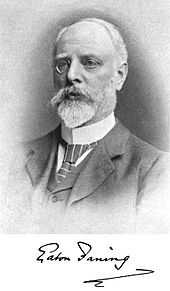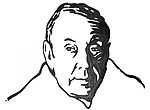Mendelssohn Scholarship
The Mendelssohn Scholarship (German: Mendelssohn-Stipendium) refers to two scholarships awarded in Germany and in the United Kingdom. Both commemorate the composer Felix Mendelssohn, and are awarded to promising young musicians to enable them to continue their development.
History
Shortly after Mendelssohn's death in 1847, a group of his friends and admirers formed a committee in London to establish a scholarship to enable musicians to study at the Leipzig Conservatoire, which Mendelssohn had founded in 1843. Their fundraising included a performance of Mendelssohn's Elijah in 1848, featuring Jenny Lind. The link between London and Leipzig fell through, resulting in two Mendelssohn Scholarships.[1][2]
Mendelssohn Scholarship in Germany
In Germany, the Mendelssohn Scholarship was established in the 1870s as a scholarship for foreign students to attend the Leipzig Conservatoire, and was funded by the Prussian state as part of an arrangement under which the Mendelssohn family donated the composer's manuscripts to the state.[3] The first recipient was the composer, Engelbert Humperdinck, who used it to travel to Italy in 1879.
The scholarship in honour of a Jewish composer was discontinued by the Nazis in 1934. It was revived by the Ministry of Culture of the former East Germany in 1963, in the form of two annual prizes for composition and for performance. It is now awarded by the Prussian Cultural Heritage Foundation.
Recipients
| |||||
As well as Humperdinck, recipients include the pianist Wilhelm Kempff and the composer Kurt Weill.
The following is an incomplete chronological list of recipients of the German Mendelssohn Scholarship.
1879 to 1935
- 1879 - Engelbert Humperdinck
- 1880 - Marie Soldat[4]
- 1881 - Bernhard Stavenhagen, Philipp Wolfrum[4]
- 1882 - Iacob Muresianu[5]
- 1887 - Waldemar von Baußnern[4]
- between 1887 and 1896 - Karol Gregorowicz
- 1890 - Bram Eldering[4]
- 1893 - Carl Thiel[4]
- 1895 - Elsie Stanley Hall[2]
- 1896 - Paul Juon
- 1889 - Percy Sherwood[6]
- 1900 - Karl Klingler[7]
- 1901 - Elly Ney
- 1902 - Alfred Sittard[4]
- 1902 - Ignatz Waghalter
- 1906 - Sara Gurowitsch[8]
- 1910 & 1913 - Ernst Toch
- 1912 - Licco Amar[4]
- 1913 - Hans Bassermann,[4] Mischa Levitzki, Max Trapp
- 1913 & 1918 - Erwin Schulhoff[9]
- 1915 - Hans Bullerian
- 1917 - Wilhelm Kempff, Emil Peeters
- 1918 - Pancho Vladigerov
- 1919 - Kurt Weill
- 1920 - Pancho Vladigerov
- 1925 - Berthold Goldschmidt, Max Rostal
- 1926 - Ignace Strasfogel,[10] Ernst Pepping
- 1928 - Hans Humpert
- 1928 - Grete von Zieritz[11]
- 1928 - Wilhelm Stross
- 1929 - Herbert Marx[4]
- 1930 - Ludwig Hölscher[4]
- 1931 - Kurt Fiebig,[4] Roman Totenberg
- 1932 - Norbert von Hannenheim, Harald Genzmer
- 1933 - Werner Trenkner, Bernhard Heiden
- 1935 - Fritz Werner, Johannes Schneider-Marfels
Since 1963
- 1969 - Peter Herrmann
- 1966 - Walter Steffens
- 1974/75 - Gabriele Kupfernagel
- 1976/77 - Reinhard Wolschina
- 1978/80 - Walter Thomas Heyn
- 1981 - Bernd Franke
- 1985 - Rolf Fischer
- 1987 - Olaf Henzold
- 1988 - Steffen Schleiermacher
- 1988/89 - Caspar René Hirschfeld
- Carola Nasdala
- Michael Schönheit
- Michael Stöckigt
- Matthias Henneberg
Mendelssohn Scholarship in the United Kingdom
Winners of the UK Mendelssohn Scholarship




The funds raised at the 1848 concert were invested and allowed to accumulate until 1856, when Arthur Sullivan was elected as the first scholar. Since then it has been awarded from time to time, administered by the Mendelssohn Scholarship Foundation, which is linked to the Royal Academy of Music. The foundation was created by a trust deed in 1871. Its trustees include the composers Anthony Payne and Justin Connolly, and the principal of the Royal Academy of Music, Jonathan Freeman-Attwood; and its charitable objects are "For the education of musical students of both sexes in pursuance of the intentions of the founders".[12]
Recipients
Recipients include the composers Frederick Corder, George Dyson,[13] Malcolm Arnold and Kenneth Leighton.[14]
The following is an incomplete chronological list of recipients of the British Mendelssohn Scholarship.
- 1856 - Arthur Sullivan
- 1865 - Charles Swinnerton Heap[1]
- 1871 - William Shakespeare
- 1873 - Eaton Faning
- 1875 - Frederick Corder
- 1879 - Maude Valerie White
- 1881 - Eugen d'Albert
- 1884 - Marie Wurm[15]
- 1890 - S P Waddington[16]
- 1905 - George Dyson
- 1935 - Daniel Jones
- 1948 - Malcolm Arnold
- 1951 - Kenneth Leighton
- 1954 - Francis Burt[17]
- 1960 - David Blake
- 1962 - Richard Stoker
- 1964 - Patric Standford
- 1968 - Brian Ferneyhough
- 1969 - Jonathan Lloyd[17]
- 1972 - Nicola LeFanu
- 1974 - Richard Blackford
- 1985 - James Harley[18]
- 1986 - Javier Alvarez[19]
- 1988 - Martin Butler
- 1997 - Richard Causton
- 2000 - Luke Bedford
- 2002 - Cheryl Frances-Hoad
References
- ↑ 1.0 1.1 A Dictionary of Music and Musicians Sir George Grove, Vol. 2, London, 1900
- ↑ 2.0 2.1 German Mendelssohn Scholarship PDF, New York Times, 7 November 1895
- ↑ Press release on the 2006 prize from the Stiftung Preussischer Kulturbesitz PDF (German)
- ↑ 4.0 4.1 4.2 4.3 4.4 4.5 4.6 4.7 4.8 4.9 4.10 Schenk, Dietmar (2004). Die Hochschule für Musik zu Berlin: Preussens Konservatorium zwischen romantischem Klassizismus und neuer Musik, 1869-1932/33. Pallas Athene. Beitrage zur Universitats- und Wissenschaftsgeschichte (in German). Franz Steiner Verlag. p. 318. ISBN 978-3-515-08328-7. Retrieved 14 November 2010.
- ↑ Compositeur Iacob Muresianu (fils) 1857-1917 at Heritage Culturel-Musical - Iacob Muresianu (French)
- ↑ Essay in Toccata Classics CD release available online as pdf
- ↑ Karl Klingler, entry at Deutsche Biographie (German)
- ↑ The Mendelssohn Prize, letter published in New York Times, 6 November 1910
- ↑ Ledbetter, Steven. "Ervín Schulhoff: Concerto for String Quartet with Wind Orchestra". Boston Symphony Orchestra. Retrieved 5 October 2012.
- ↑ Ignace Strasfogel, 84, Pianist and Conductor, obituary in New York Times, 10 February 1994
- ↑ Grete von Zieritz at www.fembio.org
- ↑ Mendelssohn Scholarship Foundation, at the Charity Commission's website
- ↑ 'On the Other Hand', Musical Opinion, April 1932, p.590 excerpt from article by Havergal Brian, retrieved from www.havergalbrian.org on 5 September 2010
- ↑ Biography of Frederick Leighton on Edinburgh University website
- ↑ A Dictionary of Music and Musicians Sir George Grove, Vol. 4, London, 1900
- ↑ Banfield, Stephen (2007). "Towards a History of Music in the British Empire: Three Export Studies". In Darian-Smith, Kate; Grimshaw, Patricia; Macintyre, Stuart. Britishness abroad: transnational movements and imperial culture. Academic Monographs. p. 85. ISBN 978-0-522-85392-6.
- ↑ 17.0 17.1 Europa Publications, ed. (2003). International Who's Who in Classical Music 19. Routledge. ISBN 978-1-85743-174-2. Missing or empty
|title=(help) - ↑ James Harley biography, on website of Minnesota State University Moorhead
- ↑ Javier Alvarez's website: http://www.temazcal.co.uk
Notes
- This article incorporates information from the equivalent article on the German Wikipedia.



